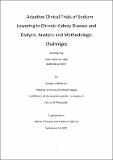| dc.contributor.advisor | O'Halloran, Martin | |
| dc.contributor.advisor | O'Donnell, Martin | |
| dc.contributor.author | Judge, Conor | |
| dc.date.accessioned | 2022-04-25T16:13:37Z | |
| dc.date.available | 2022-04-25T16:13:37Z | |
| dc.date.issued | 2022-04-24 | |
| dc.identifier.uri | http://hdl.handle.net/10379/17168 | |
| dc.description.abstract | The incidence and prevalence of kidney failure requiring dialysis is rising. Patients receiving dialysis are at increased cardiovascular risk, compared to the general population. Hypertension due to sodium and volume excess plays a key role in the underlying mechanism. Adaptive clinical trials in dialysis are urgently needed to investigate sodium lowering techniques in dialysis. In this thesis, I investigated: 1. The current use of adaptive design methods in dialysis trials, 2. Dietary sodium lowering on blood pressure outcomes and renal outcomes in a chronic kidney disease (CKD) and non-CKD population in two phase IIb randomised clinical trials (STICK and COSIP), 3. The association of dietary sodium intake and stroke in an international case control study and whether the association is modified by CKD (INTERSTROKE), 4. The association of reducing or stopping antihypertensive medications in a phase III randomised clinical trial and how this is modified by CKD (SPRINT), 5. The association of run-in periods in cardiovascular prevention trials and treatment estimates of efficacy, and, using these collective information, developed: 6. A protocol for a phase IIb, dose-finding, randomised crossover, exploratory response adaptive randomised intervention, double-blinded, multi-centre, controlled trial investigating dialysate sodium lowering in a kidney failure requiring dialysis population. | en_IE |
| dc.publisher | NUI Galway | |
| dc.rights | Attribution-NonCommercial-NoDerivs 3.0 Ireland | |
| dc.rights | CC BY-NC-ND 3.0 IE | |
| dc.rights.uri | https://creativecommons.org/licenses/by-nc-nd/3.0/ie/ | |
| dc.subject | Sodium | en_IE |
| dc.subject | Chronic Kidney Disease | en_IE |
| dc.subject | Dialysis | en_IE |
| dc.subject | Adaptive Design Methods | en_IE |
| dc.subject | Medicine | en_IE |
| dc.subject | Medicine, Nursing and Health Sciences | en_IE |
| dc.title | Adaptive clinical trials of sodium lowering in chronic kidney disease and dialysis: Analytic and methodologic challenges | en_IE |
| dc.type | Thesis | en |
| dc.contributor.funder | Wellcome Trust | en_IE |
| dc.contributor.funder | Health Research Board | en_IE |
| dc.local.note | Kidney failure requiring dialysis is increasing worldwide. Patients receiving dialysis are at increased risk of heart attack and death. High blood pressure due to sodium excess is a major cause of this risk. New ways to perform clinical trials in dialysis are urgently needed to investigate lowering sodium for these patients. In this thesis, I investigated: 1. The current use of a new type of clinical trial called adaptive clinical trials in dialysis, 2. The effect of dietary sodium lowering on blood pressure outcomes and kidney outcomes in a chronic kidney disease (CKD) and non-CKD populations, 3. The relationship between dietary sodium intake and stroke in a large international study (INTERSTROKE), 4. The effect of reducing or stopping anti-hypertensive medications in a large clinical trial (SPRINT), 5. The relationship between run-in periods in trials and how effective a treatment is, and, using these collective information, developed: 6. A protocol for a clinical trial investigating sodium lowering in dialysis. | en_IE |
| dc.local.final | Yes | en_IE |
| nui.item.downloads | 385 | |


